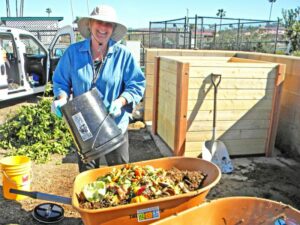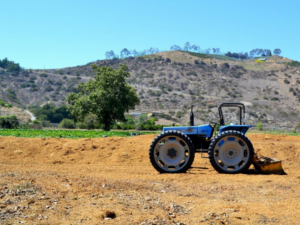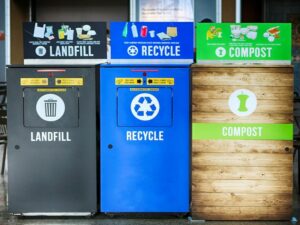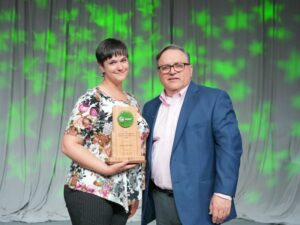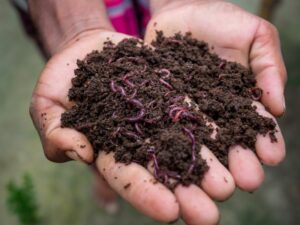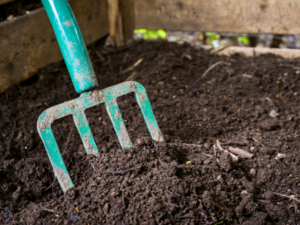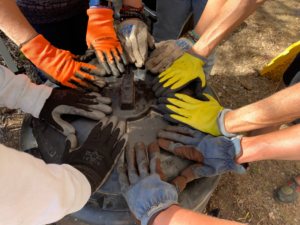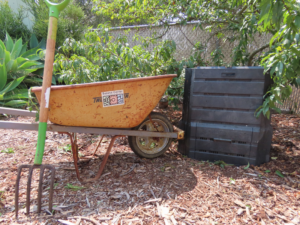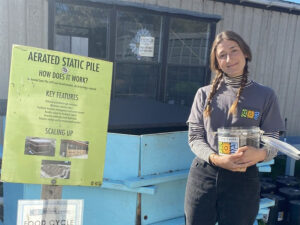Posts Tagged ‘composting’
Case Study: Food Cycle Community Compost Program
At the end of 2023, Solana Center made the difficult decision to end the Food Cycle Community Compost program. With the rollout of curbside green recycling bins, we had seen a steady participation decline, and continuing the program was no longer sustainable for our organization. We are so grateful for all of the residents and…
Read MoreBuild Healthy Soils with Free Assistance to Secure up to $100,000 Grant Funding!
Join Solana Center for Environmental Innovation (Solana Center) for a free technical assistance webinar for farmers and ranchers to learn more about applying for up to $100,000 in state grant funding. Assistance is provided by the California Department of Food and Agriculture’s (CDFA) Healthy Soils Program (HSP) for farmers to implement conservation management practices that…
Read MoreThe Benefits of Diverting Organic Waste from Landfills
Written by volunteer: Kate Sheppard Diverting waste from landfill can sometimes feel like a chore, but the benefits far outweigh the temporary annoyance of getting your hands dirty. This is especially true of organic waste. Yes, it may occasionally be sticky or smelly, but it’s not hard to properly sort and divert these compostable materials…
Read MoreNew Resource Guide: 4 Most Common Healthy Soil Farming Practices
Did you know the California Department of Food and Agriculture’s (CDFA) Healthy Soils Program (HSP) provides financial assistance to California farmers, growers, and ranchers for implementation of one or more HSP agricultural management practices to improve soil health, including compost & mulch application, cover cropping, no-till methods, conservation planting, and more? During the last solicitation period, CDFA allocated $67.5 million worth of HSP awards,…
Read MoreSolana Center for Environmental Innovation Honored with National Organics Diversion Program of the Year Award
Esteemed national organization US Compost Council recognizes local environmental leader and Encinitas non-profit for impacts in composting education and program implementation SAN DIEGO – The United States Composting Council (USCC) awarded the esteemed achievement award for Organics Diversion Program of the Year to Solana Center for Environmental Innovation which pioneered the first comprehensive curbside recycling…
Read MoreCompost: It’s Alive!
The physical and chemical conditions in a compost heap seem logical if you think about what compost really is: an enormous pile of food for billions of minute organisms. These microorganisms have certain chemical requirements, including carbon for energy, nitrogen to build proteins, and oxygen for respiration. The most numerous organisms in a compost pile…
Read MoreFrom the Rotline: Aerobic Composting and Anaerobic Digestion – What’s the Difference?
This was an inquiry to our community Rotline, a hotline where community members may ask composting and waste questions and receive step-by-step answers from one of our expert staff members. Rotline Question: What is the temperature range for a compost pile that has gone anaerobic? Answer: Anaerobic digestion can occur at two temperature ranges: between…
Read MoreLearnings from a Master Composter Course
These observations were originally shared by Kaitlin Mitchell of Rutabega Education and have been edited for cohesiveness. Solana Center’s Master Composter courses are a unique opportunity to gain a more in-depth understanding of the art and science of the composting process and empower participants to share this knowledge and passion with others. One participant in…
Read MoreFrom the Rotline: How Long Until My Compost Is Ready To Use?
Rotline Question: How long will it take until my compost is ready to be used? Answer: The timeline for composting depends on a number of factors. There are three basic approaches to composting which can be mixed and matched based on resources available and the composter’s goals. They are passive composting, active composting, and hot…
Read MoreWhat is an Aerated Static Pile (ASP)?
Have you seen us mention ASP compost before and wondering what it means? ASP stands for aerated static pile which is a powerful system that uses large pipes to circulate air from fans through the pile, eliminating the need to physically aerate the composting organic material. This system can manage large quantities of waste and makes it particularly suitable…
Read More
